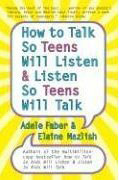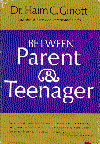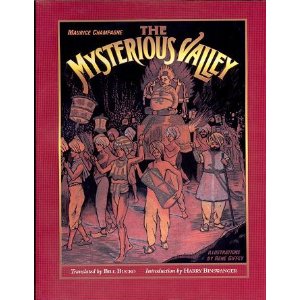Parenting Book Recommendations
 |
Featured TitleHow to Talk So Kids Will Listen & Listen So Kids Will Talk Adele Faber & Elaine Mazlish |
Not merely a parenting book, this is a delightful treasure chest of tips of how to communicate with anyone. |
|
| purchase now | |
 |
Childhood as It Should Have Been and Ought to Be Dr. Ellen Kenner, Ph.D |
Imagine going back to a typical day in your youth armed with your present philosophical knowledge. You would be able to ask yourself questions about your parents, such as: Did they help you grasp that the world is not crazy, but causal? Did they enable you to discover the joy of questioning and thinking? Did they show you how to deal effectively with "failure"—or to become value-oriented—or to protect yourself against altruism? Dr. Kenner presents the principles and skills that make parenting and childhood a pleasuraßble experience. Whether you want to raise children more effectively or want a better understanding of your own youth, this course offers you valuable insights. (Audio; 5-tape set; 6 hrs.) |
|
| purchase now | |
 |
Helping Your Child Through Your Divorce Florence Bienenfeld, Ph.D. |
|
It's not often that I read a book cover to cover and come away saying that I can recommend this without commenting that there are some parts I don't agree with. I really loved this book. She keeps the focus on your long range happiness. "I hate life sometimes. I should have been able to see my sisters. I get real angry at my mom and dad. Sometimes I'm mad at the whole world." Divorce often leaves children in a path of devastation. Some children feel the chronic need, well into their adult lives, to try to please both parents, or to show pressured allegiance to one parent and shun the other. Some children have indelible memories of horrific fights and arguments prior to and after their parents divorce. Such children may promise themselves that they will never get married - it involves too much suffering. Some children are convinced that they are the hidden cause of their parent's divorce. Feelings of abandonment, fear, hurt and guilt become the norm. It's common for children to repeat the traumas of their childhood or to withdraw into a repressed silence, cutting themselves off from the pleasures of life. But much of this pain can be avoided, and everyone benefits. How? Dr. Bienenfeld lets you first hear from the children themselves. She then outlines a step-by-step method to help parents grasp the pain that their children are in and to help parents separate their own hostilities and financial battles from parenting issues. Although the parents are no longer marital partners, they will remain parent-partners for life. Given this, she outlines a method for helping them communicate clearly and fairly on all issues involving the children. |
|
| purchase now | |
 |
Dinosaurs Divorce: A Guide for Changing Families Laurie Krasny Brown and Marc Brown |
Divorce is messy enough. But there are things that make it mentally agonizing for children. One of them is guilt--more specifically unearned guilt. Kids are at risk of thinking that it’s their fault when their parents divorce: I didn’t clean my room and dad and mom would fight over that.” The first frame of this cartoon-like illustrated book has mom and dad sitting in overstuffed chairs, each with stern, furrowed brows and not engaged with each other. The little dinosaur girl, with wide eyes, has her hands up in the air in total confusion. The caption reads: “Divorce takes place between mothers and fathers. You are not to blame if your parents get divorced.” Many a child and I have sat in therapy talking just about this one frame-- and it has helped relieve them of some heavy unearned guilt. That’s damage control. This short illustrated book covers so much: How parents fight differently: noisy battles, the silent treatment.
The authors treat children with great empathy, as individuals capable of being responsible and making the major changes in their lives easier for themselves (and for their parents). They treat kids with respect. I highly recommend Dinosaurs Divorce for you and your children if you’re going through a divorce. |
|
| purchase now | |
 |
How to Talk So Kids Will Listen & Listen So Kids Will Talk Adele Faber & Elaine Mazlish |
Not merely a parenting book, this is a delightful treasure chest of tips of how to communicate with anyone. |
|
| purchase now | |
 |
How to Talk So Teens Will Listen & Listen So Teens Will Talk Adele Faber & Elaine Mazlish |
Do you remember how supportive and understanding your parents were during your teenage years? Do you recall how you could confide in them, how they trusted your judgment and how appreciative they were of your help? For most, the answer is simple—“no!” Flash forward: Would your own teenagers consider you loving and understanding? Do they confide in you? Do they feel trusted and appreciated by you? And…do you feel loved, understood, trusted and appreciated by your teens? What gets in the way in the way of “yes” answers to these questions? In this book Adele Faber and Elaine Mazlish explore the teenage years and help parents and teens get closer to “yes” answers. They show what goes wrong (e.g., blaming, name-calling, lecturing, playing martyr) and help both parents and teens develop an attitude of earned respect and appreciation for one another. Impossible? Think again—open the pages and hear the stories of parents who have just about given up on their teens—whether it’s dealing with sassing, homework, chores, hanging with the “wrong crowd” …sexual promiscuity, binge drinking, “experimenting with pot” or discovering that your daughter has plans to meet a strange man she’s been hooking up with on the internet— watch how the right attitude and skills dramatically improve life at home. Enjoy this quick read that so effectively helps you achieve what you might have written off as impossible—a loving relationship with your teens. |
|
| purchase now | |
 |
Liberated Parents, Liberated Childeren Adele Faber & Elaine Mazlish |
| purchase now | |
 |
Siblings Without Rivalry Adele Faber & Elaine Mazlish |
| purchase now | |
 |
Between Parent and Teenager Dr. Haim Ginott |
"Many teenagers have an inner radar that detects what irritates their parents. If we value neatness our teenager will be sloppy, his room messy, his clothes repulsive, and his hair unkempt and long..." How do you make your years with your teenager not just tolerable, but enjoyable? What typical mistakes do parents make and what are the alternative civilized ways to raise your teenagers? Although dated, I owe much of my joyful years with my teenagers to Dr. Ginott's timeless advice. |
|
| purchase now | |
 |
Before It's Too Late Stanton Samenow, Ph.D. |
Why some kids get into trouble - and what parents can do about it. |
|
| purchase now | |
 |
The Mysterious Valley Maurice Champagne |
Children’s adventure story |
|
| purchase now | |
 |
Rudy’s Secret Cap Al Petitpas and Judy Van Raalte |
(available at Virtual Brands: order by email: info@vbvideo.com; Phone: 1-877-633-4656) www.vbvideo.com; Your young son comes home after his team loses a game and announces, “I’m quitting baseball. I hate it.” Sternly you lecture him: “You can’t give up! You have to stick with your commitments. Listen to the coach. Deal with failures better. Learn teamwork!” Do you think your son will lovingly turn around and say: “Oh, thanks mom. I didn’t realize that. I will happily give it another try.” Unlikely! More likely: he will tune you out, feel frustrated that you didn’t listen to him, and feel worse about himself. What can parents do when their child feels like a failure in a sport? They can get the illustrated children’s book, Rudy’s Secret Cap. Written by two sports psychologists, it’s the story of Rudy, an 8 year old, who strikes out twice, hears other kids laughing at him, tosses his new baseball glove away and runs home. He tells himself he’s a loser: “too fat, too slow, and I can’t hit.” His solution? “I’m never going back.” But Crystal, the best basketball player in the city meets up with him and gives him a baseball cap--not just any cap but one that gives him a better coping strategy. The letters C-A-P on the cap stand for specific skills: ‘C’ stands for staying Cool and she gives him a way to do this. ‘A’ stands for “Ask for help.” That’s a skill that’s not always obvious to kids feeling rejected. ‘P’ stands for think about the Positive, for example, focus on hitting the ball and not on how you may mess up. Rudy also learns the benefits of practicing, of catching, hitting and throwing the ball. These skills apply more broadly to many life issues. Interestingly, adults, reading this short book with their kids, have benefited from learning the skills along with their kids. |
|
| purchase now |

 All quotes are from Ellen's and Ed's romance book:
All quotes are from Ellen's and Ed's romance book: